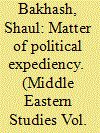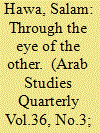|
|
|
Sort Order |
|
|
|
Items / Page
|
|
|
|
|
|
|
| Srl | Item |
| 1 |
ID:
154874


|
|
|
|
|
| Summary/Abstract |
When Reza Shah, the former ruler of Iran, died in exile in Johannesburg, South Africa, in 1944, he left some £110,000 in cash in his bank account and valuables and other items worth another £20,000. But he left no will; and the Union government proceeded to impose a tax amounting to over £43,000 (one-third of the total value) and to distribute the remainder among heirs as specified in Union law for persons who had died intestate. Reza Shah's son, Mohammad Reza Shah, the ruling Iranian monarch, hard up for money, fought these requirements. He claimed everything in his late father's possession was his, and that neither estate taxes nor distribution to heirs applied. A four-year battle over the estate ensued. It was eventually resolved, but only after vigorous efforts by two British ambassadors to Tehran, endeavours at the highest levels of the British government; the involvement of the South African prime minister and, finally, an act of the South African parliament. This article examines the intricate tug-of-war surrounding the settlement of the estate of Reza Shah and what it tells us about the principal parties involved.
|
|
|
|
|
|
|
|
|
|
|
|
|
|
|
|
| 2 |
ID:
134011


|
|
|
|
|
| Publication |
2014.
|
| Summary/Abstract |
This article seeks to apply Derrida's deconstruction of elements constituting national identity as established under colonial power to the study of Bassam Tibi, Fouad Ajami, and Bernard Lewis' work on Arab identity. This approach allows the emergence of colonial and neo-colonial elements underlying these authors' understanding of what Edward Said identified as the "Arab condition." Analyses show that both Arab authors' definition of Arab identity has been heavily influenced by colonial powers in a threefold manner: early colonization of the Arab lands by the Ottomans until 1920, European colonial rule during the nineteenth and twentieth centuries, and finally, the impact of living in the West. The article also highlights how the colonial power, exemplified in the work of Bernard Lewis, chooses to view the colonized "other" and often changes this view in accordance with political expediency.
|
|
|
|
|
|
|
|
|
|
|
|
|
|
|
|
|
|
|
|
|